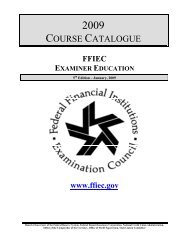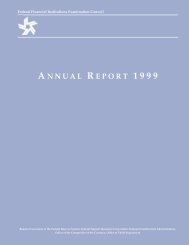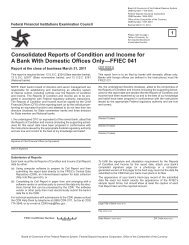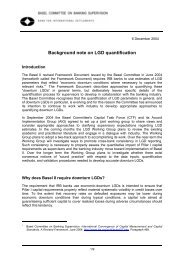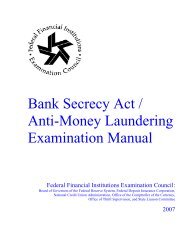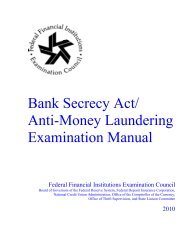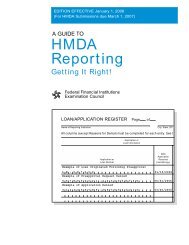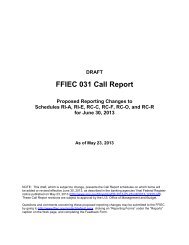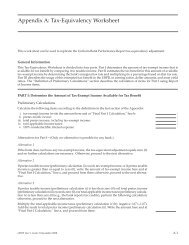Annual Report 2002 - ffiec
Annual Report 2002 - ffiec
Annual Report 2002 - ffiec
You also want an ePaper? Increase the reach of your titles
YUMPU automatically turns print PDFs into web optimized ePapers that Google loves.
NCUSIF-insured, state-chartered<br />
credit unions in coordination with<br />
state agencies.<br />
The NCUA has six regional offices<br />
across the United States that administer<br />
its responsibility to charter and<br />
supervise credit unions. Its examiners<br />
conduct on-site examinations<br />
and supervision of each federal<br />
credit union and selected statechartered<br />
credit unions. The NCUA<br />
is funded by the credit unions it<br />
regulates and insures.<br />
Office of the Comptroller of the<br />
Currency (OCC)<br />
The OCC is the oldest federal bank<br />
regulatory agency, established as a<br />
bureau of the Treasury Department<br />
by the National Currency Act of<br />
1863. It is headed by the Comptroller<br />
of the Currency, who is appointed<br />
to a five-year term by the President<br />
with the advice and consent of<br />
the Senate. The Comptroller also<br />
serves as a Director of the FDIC and<br />
a Director of the Neighborhood<br />
Reinvestment Corporation.<br />
The OCC charters, regulates, and<br />
supervises national banks to ensure<br />
a safe, sound, and competitive<br />
national banking system that supports<br />
the citizens, communities, and<br />
economy of the United States. As<br />
such, it currently regulates and<br />
supervises more than 2,100 national<br />
banks and 52 federal branches and<br />
agencies of foreign banks in the<br />
United States, accounting for more<br />
than 58 percent of the total assets of<br />
all U.S. commercial banks.<br />
The OCC helps to ensure that<br />
national banks soundly manage<br />
their risks, compete effectively with<br />
other providers of financial services,<br />
offer products and services that<br />
meet the needs of customers, and<br />
comply with applicable laws. The<br />
OCC also seeks to ensure that<br />
national banks provide their customers<br />
with fair access to financial<br />
services and treat customers fairly.<br />
The OCC's mission-critical core processes<br />
include the following:<br />
• licensing national banks and issuing<br />
interpretations related to permissible<br />
banking activities;<br />
• establishing and communicating<br />
regulations, policies, and operating<br />
guidance applicable to<br />
national banks;<br />
• supervising the national banking<br />
system through on-site examinations,<br />
off-site monitoring, and<br />
appropriate enforcement activities;<br />
and<br />
• addressing systemic risks and<br />
market trends by identifying,<br />
analyzing, and responding to<br />
emerging risks that could have an<br />
impact on the safety and soundness<br />
of national banks or the<br />
national banking system.<br />
To meet its objectives, the OCC<br />
maintains a nationwide staff of bank<br />
examiners and other professional<br />
and support personnel. Headquartered<br />
in Washington, D.C., the OCC<br />
currently maintains six district<br />
offices in New York, Atlanta, Chicago,<br />
Kansas City, Dallas, and San<br />
Francisco. In addition to the district<br />
officees, the OCC maintains a network<br />
of 59 field offices in cities<br />
throughout the United States, as<br />
well as resident examiner teams in<br />
large national banks and an examining<br />
office in London, England. The<br />
OCC recently announced plans to<br />
restructure its current six district<br />
offices into four locations. By January<br />
2004, the OCC will combine its<br />
San Francisco and Kansas City district<br />
offices into a new district office<br />
in Denver and will consolidate its<br />
Atlanta and Dallas offices into Dallas.<br />
The OCC will retain field offices<br />
in San Francisco, Kansas City, and<br />
Atlanta.<br />
The Comptroller receives advice on<br />
policy and operational issues from<br />
an Executive Committee, which consists<br />
of the First Senior Deputy<br />
Comptroller and Chief Counsel; the<br />
Chief of Staff; the Chief National<br />
Bank Examiner; the Ombudsman;<br />
the Chief Information Officer; and<br />
senior deputy comptrollers for Mid-<br />
Size/Community Bank Supervision,<br />
Large Bank Supervision, International<br />
and Economic Affairs, Management<br />
and Chief Financial<br />
Officer, and Public Affairs.<br />
The OCC is funded by semiannual<br />
assessments on national banks and<br />
from various licensing fees.<br />
Office of Thrift Supervision<br />
(OTS)<br />
The OTS was established as a<br />
bureau of the Treasury Department<br />
on August 9, 1989. The OTS has the<br />
authority to charter federal thrift<br />
institutions. It is the primary regulator<br />
of all federal and many statechartered<br />
thrifts.<br />
The mission of the OTS is to:<br />
• effectively and efficiently supervise<br />
thrift institutions;<br />
• maintain the safety, soundness,<br />
and viability of the industry; and<br />
• encourage a competitive industry<br />
to meet America’s housing, community<br />
credit, and financial<br />
services needs and to provide<br />
access to financial services for<br />
all Americans.<br />
The OTS carries out its mission by<br />
(1) adopting regulations governing<br />
the thrift industry, (2) examining<br />
and supervising thrift institutions<br />
and their affiliates, (3) taking appropriate<br />
action to enforce compliance<br />
with federal laws and regulations,<br />
and (4) acting on applications to<br />
charter or acquire a savings association.<br />
The OTS also has the<br />
authority to regulate, examine, and<br />
supervise savings and loan holding<br />
companies.<br />
The OTS is headed by a Director<br />
appointed by the President, with the<br />
advice and consent of the Senate, to<br />
serve a five-year term. The Director<br />
determines policy for the OTS and<br />
makes final decisions on regulations<br />
governing the industry as a whole<br />
and on measures affecting individual<br />
institutions. The Director also<br />
serves as a member of the board of<br />
19




